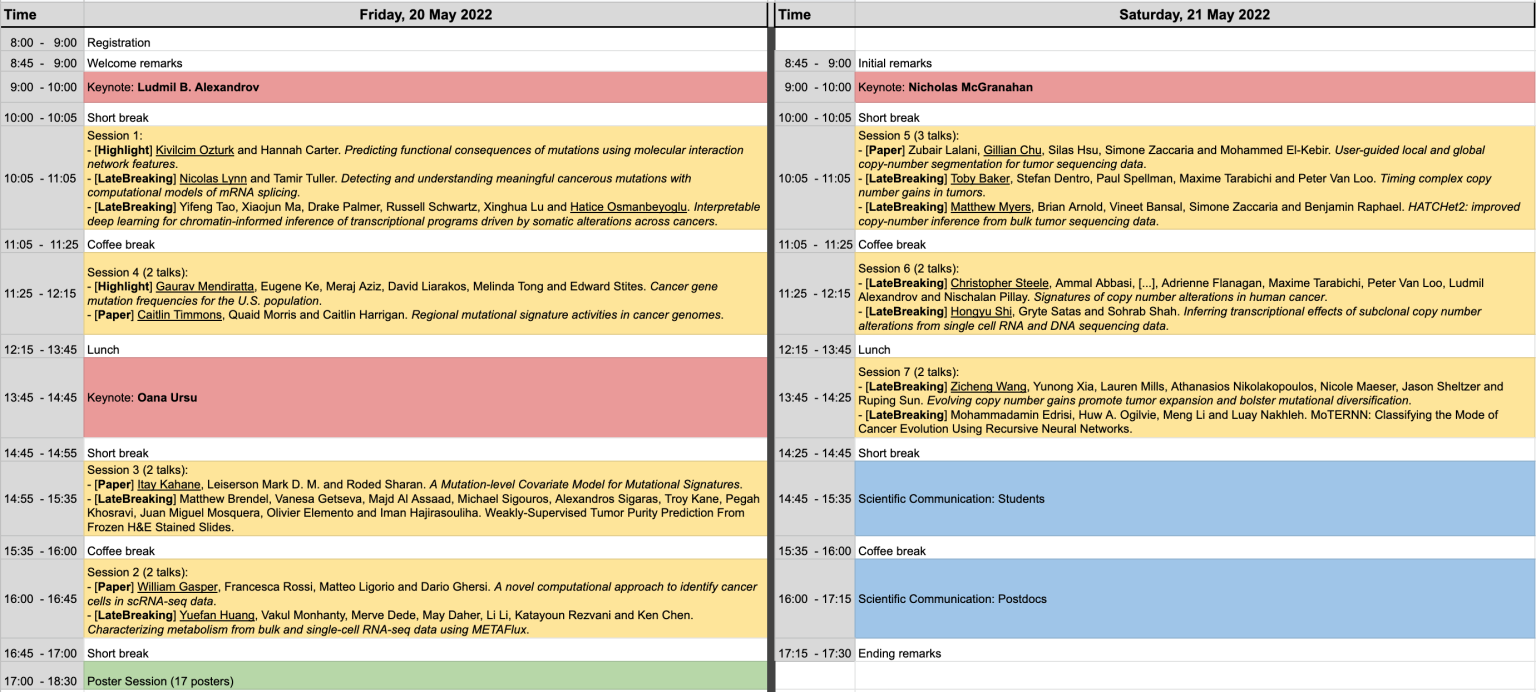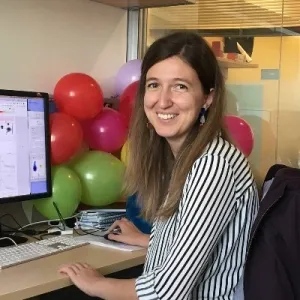RECOMB-CCB 2022
The RECOMB Satellite Workshop on Computational Cancer Biology 2022
La Jolla, USA, May 20 – 21, 2022
RECOMB-CCB 2022
This workshop brings together leading researchers in the mathematical, computational, and life sciences to discuss emerging frontiers in computational cancer research. Advent of exciting technologies such as single-cell multi-omics, spatial sequencing, and digital pathology opens new horizons for the analysis of tumor tissues. New analysis tools reveal novel aspects of cancer complexity, including the tumor mutational and phenotypic landscape, evolutionary history, or interactions with the microenvironment. The emphasis of all contributed work will be on applying algorithmic, mathematical, and statistical approaches to improve our understanding of cancer and on the development of useful, effective, and efficient new methods in this area.
Schedule
- Talks are in the Calit2 Auditorium (Directions)
- The Scientific Communication joint workshop with RECOMB-Seq on Saturday is also in Calit2 Auditorium
- Registration, coffee breaks, and posters are in the Calit2 Lobby
- Lunch on your own: Price Center Food Court or Restaurants at Sixth College

Contributions
RECOMB-CCB 2022 invites contributions in all areas of computational cancer biology in the following formats. Details are here.
- Full papers reporting on original research (considered for publication in PLOS Computational Biology) for the Paper track (deadline: February 28, 2022).
- Abstracts on unpublished research for the Late Breaking Research track (deadline: March 4, 2022).
- Highlights of recently published (since Jan 1, 2021) high-impact research for the Highlights track (deadline: March 4, 2022).
- Posters describing unpublished or recently-published work for Posters track (deadline: March 4, 2022).
Program Committee
- Hannah Carter, UC San Diego (*Chair)
- Simone Zaccaria, University College London (*Chair)
- Andrew Mcpherson, Memorial Sloan Kettering Cancer Center
- Ben Raphael, Princeton University (*Steering Committee Chair)
- Cenk Sahinalp, NCI, NIH
- Ewa Szczurek, University of Warsaw
- Fabio Vandin, University of Padova
- Gryte Satas, Memorial Sloan Kettering Cancer Center
- Gunnar W. Klau, Heinrich Heine University Düsseldorf
- Jian Ma, Carnegie Mellon University
- Matthew Reyna, Emory University
- Mohammed El-Kebir, University of Illinois at Urbana-Champaign
- Niko Beerenwinkel, ETH Zurich
- Russell Schwartz, Carnegie Mellon University
Contacts
Please direct your queries and comments to recombccb2022@gmail .com
Keynote Speakers
Nicholas McGranahan

EMBO Young Investigator Lecture
Dr Nicholas McGranahan is the group leader Cancer Genome Evolution Research Group at the University College London Cancer Institute and he is one of the leading reacher of the TRACERx (TRAcking Cancer Evolution through therapy (Rx)) lung study, guided by the CRUK Lung Cancer Centre of Excellence with Professor Charles Swanton and Professor Caroline Dive. Nicholas’s lab utilizes state-of-the-art bioinformatics and evolutionary methods to decipher cancer genome evolution and to explore patterns of tumour growth and development across cancers, focussing on lung cancer. Ultimately, his lab aims to gain a deeper understanding of the rules that govern tumour evolution and anti-tumour immunity to improve patient treatment.
Ludmil B. Alexandrov

Ludmil B. Alexandrov is an Assistant Professor of Cellular and Molecular Medicine and Bioengineering at UC San Diego. His research lab focuses on understanding the information hidden in large-scale omics datasets. The lab is particularly interested in elucidating the mechanisms by which cancers develop and in leveraging this knowledge for the development of better cancer prevention strategies and the improved targeting of existing cancer treatment. Throughout the past five years, the work of the lab has predominately focused on creating the concept of mutational signatures, on demonstrating the utility of mutational signatures in understanding human cancer, and on identifying mutational signatures in a plethora of diverse cancer types. Our believe is that by developing a next-generation of machine learning approaches, we can obtain a predictive-understanding of the basic molecular processes contributing to cancer develop, which will allow us to better prevent and treat human cancer.
Oana Ursu

Dr Oana Ursu is a postdoctoral researcher working with Dr Aviv Regev at Genentech. Oana’s research is focused on learning how cells make decisions about their internal states, and how they transition between these states, using pooled high-content screens with single-cell readouts. Oana is particularly interested in cell state changes occurring as cells develop resistance to cancer therapies, and in the role of chromatin and gene regulation in allowing cells to survive different treatments. In her talk, Oana will describe efforts in collaboration with JT Neal and Jesse Boehm’s groups at the Broad Institute to study coding variants in cancer, towards mapping their roles for tumor biology and ultimately drug response. This work uses single-cell screening technologies based on Perturb-seq to distinguish between impactful coding variants with key roles in cancer and more inert passenger mutations, with a proof of concept characterization of two hundred variants in the TP53 and KRAS genes.
Copyright © RECOMB 2022 Organizing Committee | Theme: Astra | Image: from iStock | Website editor: Simone Zaccaria